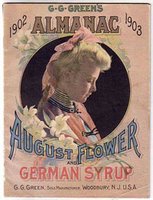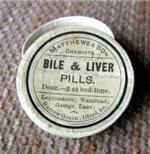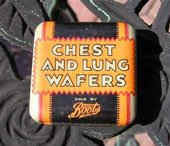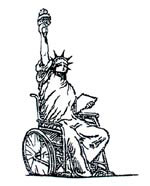 I offered the theme of "the cure" as an idea for entries and we're rewarded below with a range of posts that reveal that opinions differ, inform, change, and creatively interpret what living fully with a disability means. Prevention, prenatal screening and eugenics are intertwined with the notion of "the cure," sometimes inextricably, in the sense that they cure the world of new disabled people, and several people wrote about disability from this perspective. Others looked at being cured on a distinctly personal level, imagining the specifics of what they would wish for and what "the cure" would change about their daily lives. Also, "the cure" is sometimes fake or illusive, it presents new dangers or challenges to think beyond societal obsessions with bodily perfection and health as definitions for a fruitful life.
I offered the theme of "the cure" as an idea for entries and we're rewarded below with a range of posts that reveal that opinions differ, inform, change, and creatively interpret what living fully with a disability means. Prevention, prenatal screening and eugenics are intertwined with the notion of "the cure," sometimes inextricably, in the sense that they cure the world of new disabled people, and several people wrote about disability from this perspective. Others looked at being cured on a distinctly personal level, imagining the specifics of what they would wish for and what "the cure" would change about their daily lives. Also, "the cure" is sometimes fake or illusive, it presents new dangers or challenges to think beyond societal obsessions with bodily perfection and health as definitions for a fruitful life.While some disabled people dream desperately of a cure, some eschew any need of one, and others balance both ideas together at once, there is no doubt that living with a disability is a learning experience. The learning curve and uniqueness of each person's journey is a second theme here, reminding us that every day can be an adventure (sometimes an absurd one) when society and the world are not really built for you.
Attitude is another theme many bloggers chose to cover -- both ableist societal attitudes and their outspoken responses to them. While "nothing about us without us" has been the rallying cry for disability rights worldwide, parents and teachers of disabled children find the need to advocate and express some righteous anger for the sake of those they care for, and they're represented here too. Meanwhile, disabled adults are speaking up for basic respect and for their human rights.
And so, the carnival. Images are mostly of various medicinal, sometimes mysterious, remedies and "cures" of the past. The images themselves were found on a variety of sites selling antique curiosities.
The Cure
 Thus Spake Zuska: Too Much Pink? or, What Should I Be Doing? Zuska looks at the commodification of breast cancer and Audre Lorde's "warrior" writings. "The Race for the Cure" of breast cancer presents complex issues of fighting a deadly illness, accepting disfigurement or plastic surgery for "normalization" and the commercial, economic interests in this public but very personal cause.
Thus Spake Zuska: Too Much Pink? or, What Should I Be Doing? Zuska looks at the commodification of breast cancer and Audre Lorde's "warrior" writings. "The Race for the Cure" of breast cancer presents complex issues of fighting a deadly illness, accepting disfigurement or plastic surgery for "normalization" and the commercial, economic interests in this public but very personal cause.Processing in Parts: Changing Into Versus Being. Zilari ponders prenatal diagnosis and "prevention" and the difference between changing into someone with a certain condition and always having been that someone.
Whose Planet Is It Anyway?: Perfect Irony. Abfh examines eugenic thought and how following it would impact the world.
Diary of a Goldfish: Prevention Better than the Cure? #2. Goldfish writes about prenatal screening and its effectiveness in preventing disability in society when being born "normal" does not guarantee not being disabled.
Growing Up With A Disability: To Cure or Not to Cure, That is the Question. David discusses the prospect of cure with Ashley, a woman with a learning disability.
 Ballastexistenz: Hey, Watch It, That's Attached! Amanda takes a detailed look at what "the cure" would change about her entire body -- and life.
Ballastexistenz: Hey, Watch It, That's Attached! Amanda takes a detailed look at what "the cure" would change about her entire body -- and life.Arthritic Young Thing: It's Not Just Me. Zephyr examines the complex journey of her disability experience, involving denial, expectation and hope of cure, and the bittersweet relief of acceptance.
Thou Shall Not Suck: Hope Matters. Unholy Moses adds to his previous post about Michael J. Fox's stumping for pro-embryonic stem cell research candidates by noting he has a personal stake in the issue and that the scientific freedom to explore ESC provides much-needed hope.
Diabetes Mine: Pssst -- Diabetes Cures for Cheap! (Gotcha!!) Amy Tenderich reminds us that not every treatment or cure offered is real. Some are scams and some can be dangerous.
Pedestrian Hostile: Glass Helmet. Jennifer Justice recalls how a surgical procedure meant to fix her left her worse off than she was before.
Planet for the Blind: On Being Well. Stephen Kuusisto shares a memory of a morning with Mia Farrow and some of her adopted disabled children that illuminates the difference between being cured and being well.
The Learning Curve
Temporal Island: Blind Cricket. Deanne describes her first try at blind cricket and looks ahead to the prospect of improving her game.
Chair on Wheels: 20 Things I Learned in Portland. Kevin presents a list form of his adventures on a recent trip to a conference on rural independent living, including an encounter with an aggressively affectionate drunk woman.
 Arthritic Young Thing:The Dance of Yesterday. Zephyr lives in a body with chronic pain and the need for cautious movement, but yearns to dance like she used to.
Arthritic Young Thing:The Dance of Yesterday. Zephyr lives in a body with chronic pain and the need for cautious movement, but yearns to dance like she used to.Ryn Tales: Handicap Placards and New Car Purchase in Summer's Heat. Kathryn Stanley talks about the bureaucratic complications to getting that little disable access placard for a new car.
But You Don't Look Sick: Watch Your Meds. Karen Brauer cautions about medication theft, particular for people with chronic conditions where their medications have high street value.
Attitude
A Letter to My Children: Step Away, Other Mother, Or I Shall Sic My Worms on You. Lisa Ferris writes about a Mommy Drive-By on the playground where her entire right to parent is challenged.
Terrible Palsy: Special Needs Playgroup. Mom of Moo hears another mother's ugly tale of ableism by a pediatrician at the hospital.
Postcards from Holland: They. Another Mom, Apostrophe S, finds that an older relative can't accept or relate to her child.
The Short Bus Queen: Miss B. Stirs the Pot a Little Bit More. Special Ed teacher Miss B. speaks up for a former student she learns is being bullied at a different school.
The Life and Times of Emma: Disability Questions. Wheelchair Princess takes on ten questions about her life with cerebral palsy. The first is essentially about "the cure."
 Fey and Strange: Adults Acting Like Children. Fey Stranger brings the anger for parents of small children that, well, do all sorts of things to make life difficult for wheelchair users.
Fey and Strange: Adults Acting Like Children. Fey Stranger brings the anger for parents of small children that, well, do all sorts of things to make life difficult for wheelchair users.Crip Revolution: Damn A Baby Boomer. Al Masters rants about aging boomers "discovering" what's wrong with health care and other aspects of society PWDs have been talking about for years.
One Can Dream: And Yet, I Am Not Free. Ramona Harvey tells of the troublesome leadership of the state independent living council in Indiana (ICOIL), where she serves as secretary yet finds she is not free to speak her mind at council meetings. (Kevin of Chair On Wheels provides a backup account complete with numerous corroborating links.)
***
There you have it! Thanks to all who submitted their own writing or nominated someone else's work, and thanks to Penny Richards for beginning this carnival thing.
The third Disability Blog Carnival will be on Thursday, November 9 (submission deadline Monday, November 6) at David Gayes' Growing Up With A Disability. Entries can be sent in here, to the carnival site, or through email if necessary.
0 comments:
Post a Comment